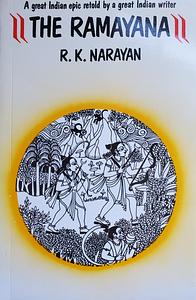Take a photo of a barcode or cover
emotional
informative
inspiring
reflective
slow-paced
Plot or Character Driven:
A mix
Strong character development:
N/A
Loveable characters:
Yes
Diverse cast of characters:
Yes
Flaws of characters a main focus:
Complicated
challenging
dark
informative
sad
slow-paced
Plot or Character Driven:
A mix
Strong character development:
No
Loveable characters:
No
Diverse cast of characters:
Yes
Flaws of characters a main focus:
Complicated
adventurous
inspiring
reflective
medium-paced
Plot or Character Driven:
A mix
Strong character development:
No
Loveable characters:
No
Diverse cast of characters:
No
Flaws of characters a main focus:
Complicated
I love readings Epics and old, old mythologies and really making the connections between them all over the world. Icarus burning his wings in Greek mythology to Sampati, the vulture, who burned his wings on account of protecting his brother when they both flew too close to the sun in Ramayana. There are some obvious parallels like this one, or another one between Hindu religion and the Abrahamic faiths that I discovered when talking to a friend. Krishna is carried across a river in a basket when a king starts killing male babies because he hears of a prophecy that one of them will rise to kill him which is so similar to the story of Moses I've heard. The Hindu Gods also resemble the Greek Gods; Indra - Zeus, Vayu - Eurus. But what I really love about Epics is that you can sort of trace back all fantasy fiction to it. You can also see the trend of black and white truths and, of course, the rampant sexism. The part that's always bothered me the most. This one goes on to feminizing the land and calling the King the husband of the land and with his death comes the widowhood of the land.
Random musings:
- All the old myths and epics I've read always describe the Men as beautiful, having slender faces and almond-shaped eyes and smooth complexion. All attributes that are now seen as feminine.
- Ew at the concept of a woman existing to serve her husband. and the idea of a man having several wives and consorts.
- Also had the plotline of a man going near insane with grief on losing his lover.
- I haven't read book 7 of this Epic. I read it in my Norton Anthology of world literature so parts of the previous books + book 7 are missing.
Random musings:
- All the old myths and epics I've read always describe the Men as beautiful, having slender faces and almond-shaped eyes and smooth complexion. All attributes that are now seen as feminine.
- Ew at the concept of a woman existing to serve her husband. and the idea of a man having several wives and consorts.
- Also had the plotline of a man going near insane with grief on losing his lover.
- I haven't read book 7 of this Epic. I read it in my Norton Anthology of world literature so parts of the previous books + book 7 are missing.
adventurous
inspiring
slow-paced
Plot or Character Driven:
Plot
Strong character development:
Complicated
Loveable characters:
Yes
Diverse cast of characters:
Yes
Flaws of characters a main focus:
No
Reads like any mythology. Things simply are or are not. Interesting, creative, and at times even humorous.
The reason I'm giving this five stars is because the author provides a detailed glossary of anglicized sanskrit words, as well as a guide to pronouncing sanskrit vowels. While he chooses not to include a translation of what he calls "the legend" of Sita's betrayal, he still provides an extremely detailed translation of Valmiki's text as it is, including some translation from the poet Kamban's version of the Ramayana (who translated it into Tamil). However, this book is very simply put forward, as he says, for children and mothers. The sentences are simple and short, while not boring to more advanced adult readers. He presents the text like a teacher, stopping the narrative occasionally to remind us of something, or to discuss a character's moral action or a writing tool used by Valmiki or Kamban. The author's own Gandhian belief system is apparent, so if you're looking for an unbiased translation don't look here. But if you're looking for a simple yet beautiful translation with context, this is the version you want.
I enjoy learning myths from all parts of the world, and find it fascinating how these early storytellers and writers saw heroism, plot, dialogue, gender relations and all sorts of things. I do believe a culture is its stories, and this one was full of people who wanted to do good, mostly. It read like a very confident back story by a first time roleplayer that just went on and on, and I love that as an idea of where writing should start. So great.
Was it too long? Absolutely. Was it a bit absurd in how perfect Ram was seen? Sure. But for an early story, it was fluid and dramatic. Definitely worth the time!
Was it too long? Absolutely. Was it a bit absurd in how perfect Ram was seen? Sure. But for an early story, it was fluid and dramatic. Definitely worth the time!
Despite the simple and plein langue the narration appears to be so fascinating. It is no wonder why did this myth became an integral part of the world literature. It is hard not to fail in the trap of presentism, but I am afraid I cannot help myself. The story portrays anyone who fails to deify the protagonist as a demon or a traitor, which makes sense because he is a reincarnation of Vishnu. At the closer look, however, those unfavourable ones tend to be people of a different ethnicity, women and even gods unwilling immediately satisfy the whims of a spoiled boy. I believe it is quite important to keep in mind when we discuss the story nowadays.
adventurous
inspiring
tense
medium-paced
Plot or Character Driven:
Character
Strong character development:
Yes
Loveable characters:
Complicated
Diverse cast of characters:
Yes
Flaws of characters a main focus:
Yes
adventurous
emotional
hopeful
inspiring
fast-paced
Plot or Character Driven:
A mix
Strong character development:
Yes
Loveable characters:
Yes



